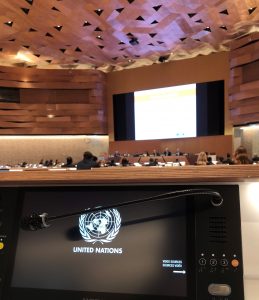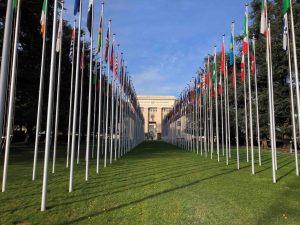Yan Wang
While supporting the United Nations Human Rights Committee (the Committee) in its work during the fall of 2019, I encountered a particularly controversial issue concerning the scope of article 7 of the International Covenant on Civil and Political Rights (ICCPR).
The issue is whether a State’s act (or omission) that causes an individual anguish or distress related to the death of a family member interferes with that individual’s mental integrity and could constitute inhuman or degrading treatment under article 7 of the ICCPR. If so, what should the requirements for finding a violation be?

UN meeting in session
Article 7 of the ICCPR provides:
No one shall be subjected to torture or to cruel, inhuman or degrading treatment or punishment. In particular, no one shall be subjected without his free consent to medical or scientific experimentation.
The Committee’s jurisprudence confirms that article 7 of the ICCPR protects an individual’s mental integrity against inhuman or degrading treatment.[1] In recent decisions in individual communications, however, the Committee found no violation of the rights of the victims’ family members. The Committee’s application of article 7 is relatively narrow compared to the approaches adopted by other jurisdictions interpreting similar provisions in other human rights treaties or legislation.
Provisions with similar purposes are found in several international treaties and domestic statutes in common law jurisdictions such as Canada and have been interpreted more broadly.
International treaties compared to Canadian laws
Article 3 of the European Convention on Human Rights (the European Convention), on the prohibition of torture, has similar wording to article 7 of the ICCPR:
No one shall be subjected to torture or to inhuman or degrading treatment or punishment.
Similarly, article 5(1) of the American Convention on Human Rights (the American Convention) sets out the right to humane treatment:
Every person has the right to have his physical, mental, and moral integrity respected.
On the national level, many common law jurisdictions protect an individual’s mental integrity from inhuman or degrading treatment. In Canada, for example, an individual’s psychological integrity is protected under section 7 of the Canadian Charter of Rights and Freedoms (the Charter), which provides:
Everyone has the right to life, liberty and security of the person and the right not to be deprived thereof except in accordance with the principles of fundamental justice.
Comparing the approaches of three courts
A comparative review of cases applying the aforementioned international and national provisions by the European Court of Human Rights (the ECtHR), the Inter-American Court of Human Rights (the Inter-Am CtHR) and the Supreme Court of Canada (the SCC) shows that there are similarities in the framework adopted by these three courts. While disparities also exist with regard to the standards for finding a violation, the tests adopted by the Inter-Am CtHR and the SCC are broader than the present interpretation of article 7 of the ICCPR by the Committee.

European Court of Human Rights. Photo credit: Council of Europe
First, all three jurisdictions require the individual who claims violations of their rights under the relevant provisions to establish a certain degree of mental suffering. The mental suffering should be “serious” (SCC), “exacerbated” (Inter-Am CtHR), or should have a distinct dimension or character (ECtHR). However, the ECtHR has imposed a higher bar by requiring the presence of specific special factors, while both the SCC and the Inter-Am CtHR have held that not being able to find closure with regard to a family member’s death is sufficient for establishing the required degree of mental suffering. The SCC has interpreted being able to get social redress as a form of finding a closure. The Inter-Am CtHR has emphasized the vital role of the realization of social justice in finding a closure.
Second, all three jurisdictions have held that State action with respect to family members may constitute inhuman or degrading treatment, even if the State is not held directly responsible for the suffering of the victim. The SCC has adopted a generous test for causation and held that the State’s contributory role to an individual’s suffering would suffice to prove the causal connection between the State conduct and the individual’s suffering. The Inter-Am CtHR has even signaled the possibility that state action can be found to create a new psychological damage if state action worsens the existing psychological suffering of an individual. On the other hand, while the ECtHR held that such a standard applies to “disappeared person” cases, [2] it is not clear from its jurisprudence whether the same standard also applies to “confirmed death” cases, as it does in the other two jurisdictions.
Recommendation for a broader interpretation of art. 7 of the ICCPR
Drawing on the example of the approaches adopted by the SCC and the Inter-Am CtHR, Article 7 of the ICCPR should be interpreted more broadly than it currently is.
The rights protected under article 7 of the ICCPR are fundamental. The Committee has observed that the text of article 7 allows of no limitation. No derogation from the provision in article 7 is allowed, including in situations of public emergency.
A broader approach will better serve the purpose of article 7 of the ICCPR. Compared to ECtHR, the logic adopted by the SCC and the Inter-Am CtHR is more compelling and addresses potential problems that may be caused by impunity. If only State conduct that directly caused the death of a victim can be held to be a violation of the victim’s family members’ rights to mental integrity, then any ongoing or subsequent State conduct, although in fact inflicting mental suffering on the family members, would be immune from penalty. Such a result is to the contrary of the purpose of article 7 of the ICCPR. The issue is particularly important given that the Committee is often the last resort for many victims to seek redress to a State party’s violation of their rights.

UN Palais des Nations
[1] See, for example, General Comment No. 20 (1992) on article 7, at para 2, and Siobhán Whelan v Ireland (CCPR/C/119/D/2425/2014), at para 7.7.
[2] See, for example, Osmanoğlu v. Turkey, ECtHR, application no. 48804/99, at para 96.
Yan Wang is a 2L student at the Peter A. Allard School of Law and working with the IJHR Clinic as a part of the UN Human Right Committee Team doing research and analysis.